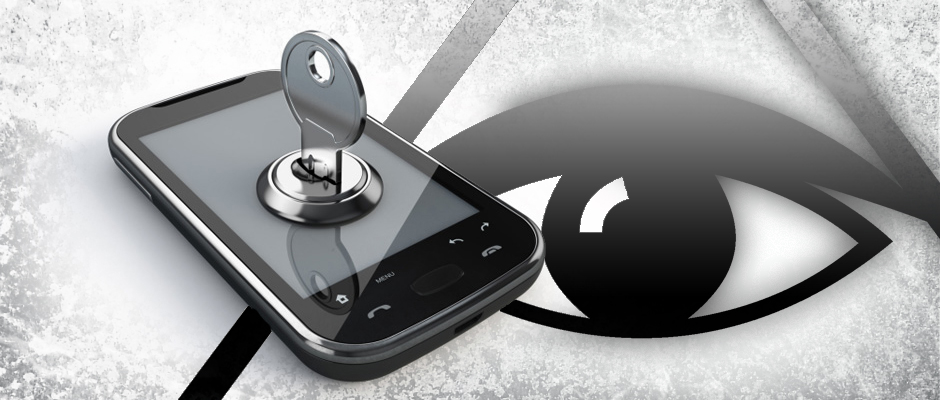Secure Your Cell Phone
Whether you are worried about a prying loved one or the NSA, the information on your cell phone can be accessed by a third party. It’s actually quite easy these days to spy on someone through their cell phone. You might very well be a victim right now and not know about it.
Several news agencies, such as The New York Times and the Guardian, have reported on the problem. Documents released by former NSA contractor Edward Snowden even demonstrated how governments collected data transmitted by companies and apps such as Facebook, Flickr, Flixster, Google Maps, LinkedIn, Photobucket, and even Twitter. Sometimes all it takes is installing a spy app on someone’s phone while they have stepped away. These might include apps like FlexiSpy, Auto Forward, My Spy, Stealth Genie, or you can purchase countless other apps.
Speaking of which, do you remember when the Wall Street Journal and the Guardian reported how the US Marshals Service was flying Cessna aircraft outfitted with something called a “dirtbox” that basically mimics cell towers? By doing so, they were able to collect thousands of unique IDs and location data from users. The goal was/is to allow “marshals and potentially other justice department agencies to avoid having to seek records from the phone companies themselves, especially in criminal investigations where a court order may be required.”
Without a certain amount of protection, anyone can use your cell phone as a beacon. This means that government agencies and hackers have the means to track conversations, browse your pictures and texts, or discover your location. In fact, they can even use your camera to see what you’re doing or turn on speakerphone and use it as a microphone to listen in on what you are saying; all without you even having your phone turned on. And again, this is done rather easily.
The good news is that you can protect yourself from these intrusions. The first thing you need to understand is that ‘spying’ on phones is illegal. If you suspect you are being spied on, the police can get involved. It may also be against your Constitutional Rights. Consider the following:
- The First Amendment protects the privacy of beliefs
- The Fourth Amendment protects privacy against unreasonable searches
- The Fifth Amendment protects against self-incrimination, which in turn protects the privacy of personal information
- The Ninth Amendment says that the “enumeration in the Constitution of certain rights shall not be construed to deny or disparage other rights retained by the people.” This has been interpreted as justification for broadly reading the Bill of Rights to protect privacy in ways not specifically provided in the Bill of Rights.
- And consider the Due Process Clause of the 14th Amendment, which states: No state shall make or enforce any law which shall abridge the privileges or immunities of citizens of the United States; nor shall any state deprive any person of life, liberty, or property, without due process of law; nor deny to any person within its jurisdiction the equal protection of the laws.
But as we already know, neither the government nor criminals really care about your Constitutional Rights or what is “right” or “wrong.” If they did, I wouldn’t need to write such an article. You still need to know how to protect yourself. The good news is that there are ways to combat this increasing problem. So let me provide a few times and a few links to help.
The Basics
- Keep your phone with you at all times. NEVER assume it is safe. It only takes a few minutes to install spy software, and you’ll rarely notice it when it’s installed.
- If you are not going to be using your device and you are not going to be taking any calls, turn it off.
- Put your phone into airplane mode while playing games.
- Turn off the GPS service when it’s not in use.
- Use a virtual private network (VPN) while connected to the Internet.
- Turn off Bluetooth when it’s not in use.
- Refuse incoming Bluetooth connections from people you don’t know.
- Turn off cellular data connections.
- Disable the device’s Internet connection when it’s not in use.
- If you must – ONLY post on social media accounts while connected to secure, password-protected networks (that you trust). Cellular data networks are insecure and easy to hack.
- Install an anti-spyware or anti-tracking app on your phone.
- Turn off Wi-Fi, GPS, and geolocation on your phone.
If it’s a HUGE problem.
- Go to your service provider and tell them your phone is acting weird. Ask them to check the phone to see if someone might have set up a monitoring feature on your account or on the phone.
- Get a disposable phone. Purchase it with cash and do not store numbers, pics, texts, etc., on it.
- Get rid of the smartphone.
If You’re Not a Security Guru or Just Need It Sometimes
And you never know when you’ll need or want the ability to be discrete. A very cheap and effective way to go about doing this is with a Signal Blocker Pouch. This pouch will stop ANY communication or signal going in or out as long as it’s in the pouch. You don’t need to be some counter-security expert to protect yourself; you just place the phone in the pouch. These pouches are also good for placing ID cards, bank cards, and anything else that revolves around RFID or magnetism in regard to your information. They are very effective. Here are a few links to some inexpensive ones on Amazon.
- Ska Direct® Cell Phone Privacy Protection Bag
- Co-Link Signal Blocker Pouch
- Co-Link Signal Blocker Case Bag
Be sure to check out my article titled, “Some Dangers of Social Media Posts.”




